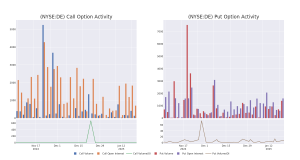Chip stocks fell across the board early Thursday after a Nvidia (NVDA) supplier made comments on its earnings call that indicated uncertainty in semiconductor demand this year.
South Korea-based SK Hynix (000660.KS) makes memory chips used in Nvidia’s GPUs (graphics processing units) — chips used in data centers to power artificial intelligence software. After reporting fourth quarter earnings that surpassed analysts’ expectations, SK Hynix head of finance Woo-Hyun Kim remarked on the year ahead in a post-earnings call: “2025’s memory demand outlook is clouded by inventory adjustments from PC and smartphone OEMs [original equipment manufacturers] as well as strengthened protective trade policies and geopolitical risks.”
Following the comments, Nvidia sank as much as 2%. British chip designer Arm (ARM) dropped nearly 6%, and SK Hynix rival Micron (MU) fell nearly 4%.
Meanwhile, Nvidia rival Advanced Micro Devices (AMD) and Broadcom (AVGO) both fell around 1%.
The stocks’ declines come after a rally the prior day following news from US President Donald Trump of a massive AI infrastructure project called Stargate, funded by OpenAI, SoftBank (SFTBY), Oracle (ORCL), and UAE-based MGX.
Kim’s commentary highlighted the divergence in the market for semiconductors used in consumer products and those used in data centers for artificial intelligence.
As Needham analysts wrote in a Jan. 13 note to investors: “2024 saw a sharp divergence of the fortunes of semiconductor companies exposed to different end markets. Semiconductor suppliers exposed to the PC, smartphone, industrial and automotive sectors generally saw fundamentals under pressure through the year due the combination of weak end demand conditions and digestion of excess inventory.”
“On the other hand, the Al segment experienced strong demand on accelerating deployments of Al infrastructure.”
SK Hynix’s Kim also commented on this transition: “As AI memory demand grows, the memory industry is transitioning from a commodity market driven by volume and price to our customized market focused on high-performance and high-quality products.”
Kim added that demand for memory chips used in AI data centers is “expected to continue, driven by Big Tech companies’ ongoing competitive investments to secure advanced AI training and inference capabilities.”
Still, Needham analysts warned in their note that the divergence in non-AI and AI chip stocks may narrow as they see growth in Al revenue beginning to decelerate in 2025. Big Tech companies, including Google and Microsoft in recent quarterly earnings calls, have indicated that their massive AI spending will begin to grow more slowly going forward.


